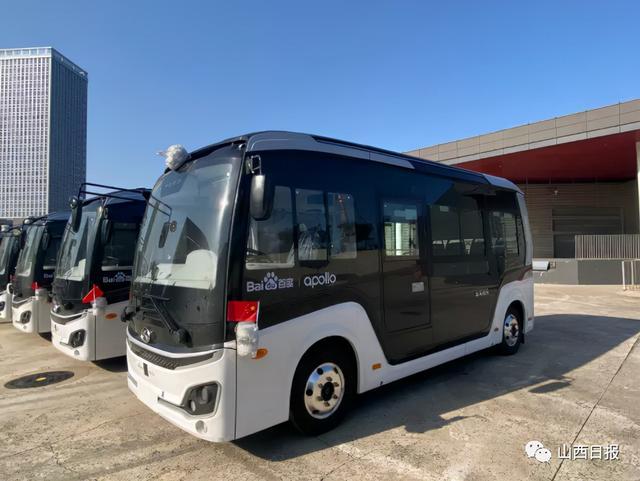Yangquan in N China's Shanxi shifts to green development through burgeoning automated driving industry
Once having thrived on its local coal industry, Yangquan city, in north China's Shanxi Province, has successfully blazed a new trail in the automated driving industry.
Since 2012, the city has shifted to a green development path, and has become China's first city to carry out autonomous driving in all of its administrative areas, having meanwhile served as a pilot city for the application of the Internet of Things in China.

Photo shows unmanned buses in Yangquan. (Photo/Shanxi Daily)
Today, driverless buses, taxis, and unmanned delivery vehicles are very common on the roads inside the city. A newly-launched self-driving vending machine, for example, can offer you some snacks on the go. It is loaded with drinks and snacks by staff members before it hits the road. Measuring 1.5 meters in length and 1 meter in width, the driverless vehicle can automatically create the most optimized route to travel all by itself, avoiding obstacles on the road and travelling safely, even in rush hours. To buy something from it, one just needs to hail the machine. Then it will slow down and stop. The customer can place the order using a smartphone, and then open the door to collect whatever they ordered.
“While actively striving for green development in the traditional coal industry, Yangquan, once relying heavily on coal, must forge a new pillar industry to turn itself into a city of green and low-carbon development,” observed Lei Jiankun, secretary of the Yangquan Municipal Committee of the Communist Party of China, who added that the digital economy will account for a large proportion of the new pillar industry in the city.
Besides, a test base for autonomous driving and related infrastructure systems operated by China’s Internet giant Baidu, opened on Feb. 25 in Yangquan. It incorporates several research and development centers, a big data remote control center, an operation center, and an experience and exhibition center, among other facilities, effectively supporting the city’s efforts in the area of smart travel technology.
Baidu’s self-driving taxi service Apollo Go and driverless vehicles that integrate 5G technology launched by Neolix, a Chinese autonomous vehicle firm, are also making the travelling solutions available to the city even more smarter. So far, 10 Apollo Go vehicles have been used to cover 30 stations throughout the city.
Moving forward, the city will put more and more driverless buses, delivery vehicles, and vending machines into operation in its attempt to build a smart transportation network.
Photos
Related Stories
Copyright © 2022 People's Daily Online. All Rights Reserved.









